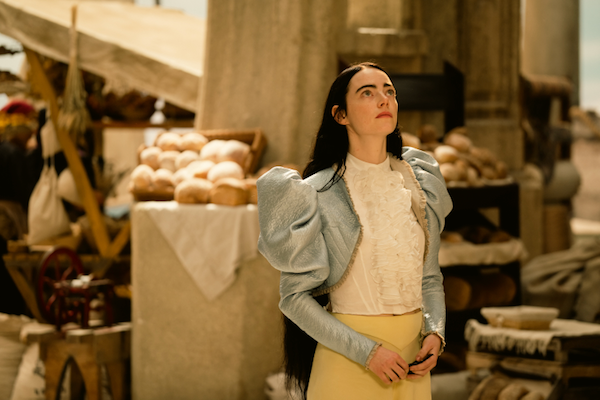Movie review by Greg Carlson
In a movie year that brought to life an iconic plastic fashion doll and a theoretical physicist who ushered in the Atomic Age, there was no shortage of memorable characters. But for my money, the crown for the most remarkable cinematic creation of 2023 sits atop the head of reanimated adventurer Bella Baxter. Brought to life (after death) by Emma Stone in a comprehensively mesmerizing performance, Bella – who, the story explains, is simultaneously her own daughter and her own mother – takes viewers on an odyssey of the mind and the body.
Stone and director Yorgos Lanthimos make one hell of a team, collaborating with a set of top-notch castmates and craftspeople to work up one “diabolical fuckfest of a puzzle” based on the 1992 novel by Alasdair Gray. The screenplay by Tony McNamara honors the grandest themes of Mary Shelley’s infinitely influential “Frankenstein,” catapulting the 1818 touches of the Gothic and the Romantic to a kind of otherworldly, steampunk-influenced fantasia that reimagines the Victorian Era with retrofuturistic eye candy in every direction. As the Victor Frankenstein-esque Godwin Baxter (God, for short, and a nod to Shelley’s papa), Willem Dafoe works all the wonders of rationality beneath a patchwork of facial scars inflicted by his own character’s father in the pursuit of knowledge.
Dafoe’s delightful mad scientist is really anything but mad. His frank practicality can stun and even shock assistant/student Max McCandles (Ramy Youssef), who arrives at Godwin’s home surgery to study Bella – if not to rapidly fall under her spell. God’s unvarnished honesty rubs off on his spectacular “experiment,” as Bella’s uninhibited directness pumps the film full of frequently anachronistic and always hysterical wordplay. In one scene, Max reads aloud a postcard from Bella: “Me good Lisbon sugar tart lick me all day.” He hopes it is all one sentence.
The comic grenades continue to detonate with the arrival of caddish attorney Duncan Wedderburn (Mark Ruffalo), a horny and mischievous rakehell whose plan to fornicate with nary a pause (“Why do people not do this all the time?” wonders the equally insatiable Bella) is thwarted when Bella’s emotional intelligence quickly outstrips his. If, as Bernard Dick argues, all horror is in some way predicated on metamorphosis, then the Frankenstein mythology belongs to that genre as much as it does to science fiction. The horror of “Poor Things,” however, lies not in Bella’s physical transformation but rather in her understanding of men and how they operate. A volume of that knowledge will be earned in the Paris brothel run by Madame Swiney (Kathryn Hunter).
As she labors to master language and understand common social behavior, the early Bella glows with an aura evoking both holy foolishness and the incongruous, plain-speak wisdom of Chance the gardener and Forrest Gump. But watching Bella’s rapid education, which accelerates from a huge appetite for “furious jumping” (her words for sexual intercourse) to an appreciation of significant philosophical questions, is one of the movie’s greatest joys and one of Stone’s greatest triumphs as a performer. If substantive change inspired by an arc of experience defines a strong character, Bella Baxter shines as brightly as any diamond. She’s just as tough, too.
